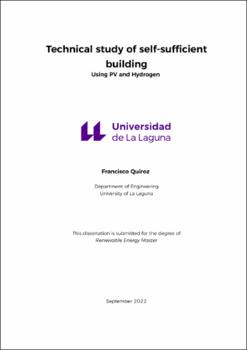Technical study of self-sufficient building using PV and Hydrogen
Author
Quiroz Salazar, FranciscoDate
2022Abstract
The increase of carbon dioxide in the atmosphere and the scarcity of raw materials lead
to the development of new forms of energy generation and storage. This document
studies the possibility of self-sufficient buildings using the sun’s energy for power generation and hydrogen as a storage source. The proposed system must be capable of
being self-sufficient, providing the necessary electrical and thermal energy for the comfort of a home located in the city of Munich, Germany. To obtain the necessary electrical
energy, the system will have a photovoltaic field and a combined heat power. In turn,
to supply the thermal demand, a heat pump and a boiler are included in the system.
The variability of renewable energy will be managed by the different forms of storage,
it is intended to include a battery system, a hot water tank and a hydrogen tank. For
the correct integration of hydrogen, the system includes an electrolyser which use the
excess of electrical generation to produce hydrogen, in addition, both the combined
heat power and the boiler will be able to use the stored hydrogen as a fuel. According
to the simulations, it is concluded that a house with an annual electricity consumption of 5.400 kW and a thermal load of 15.651 kWh can be self-sufficient using the
proposed model an even more allows a total of 6.238 kWh to be delivered to the grid.





